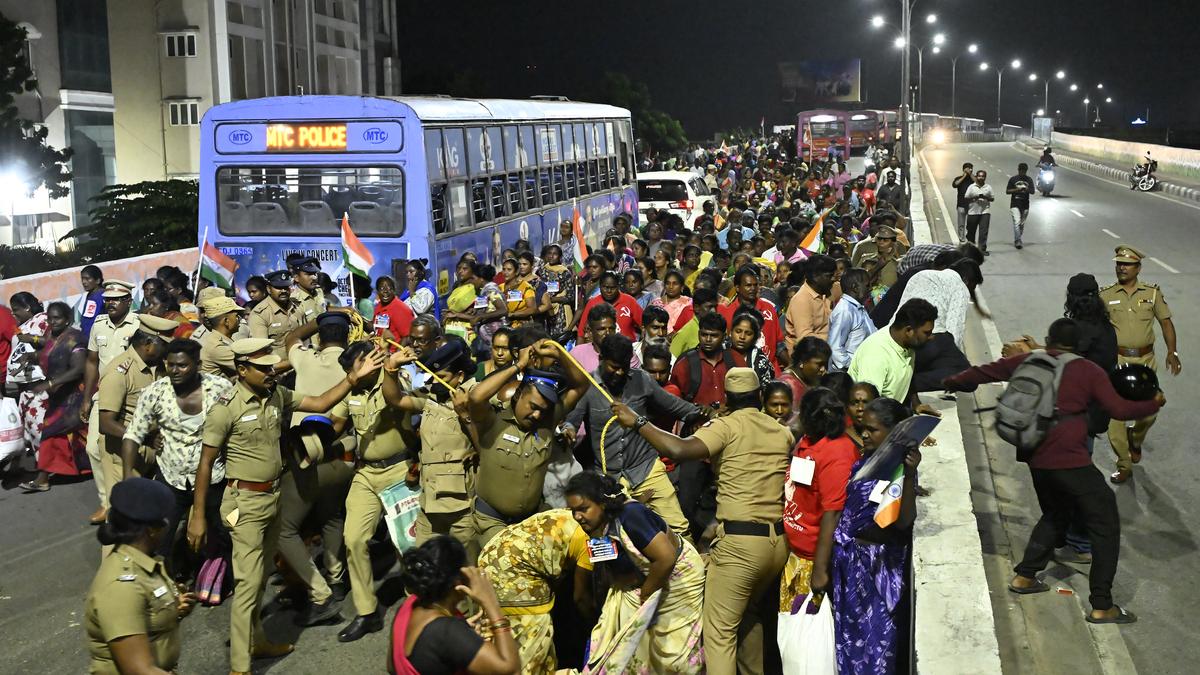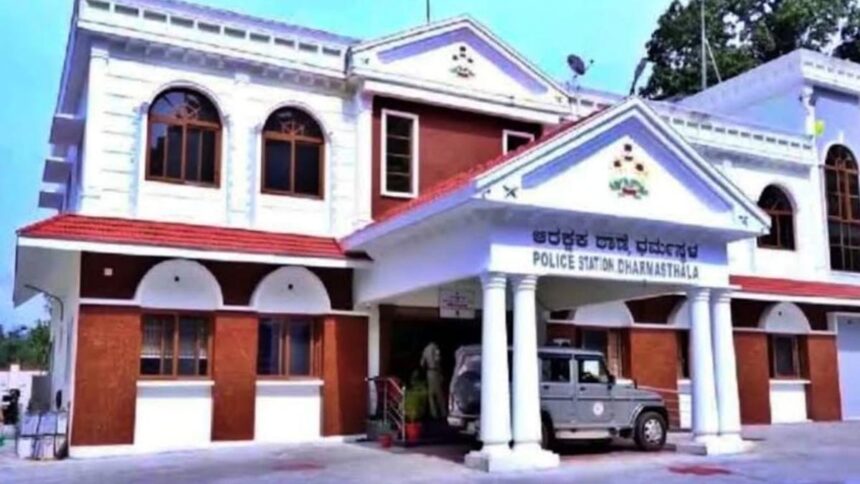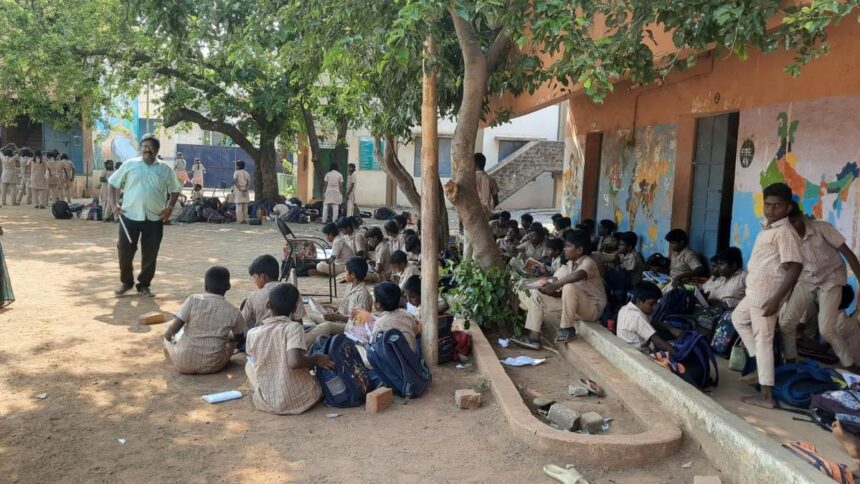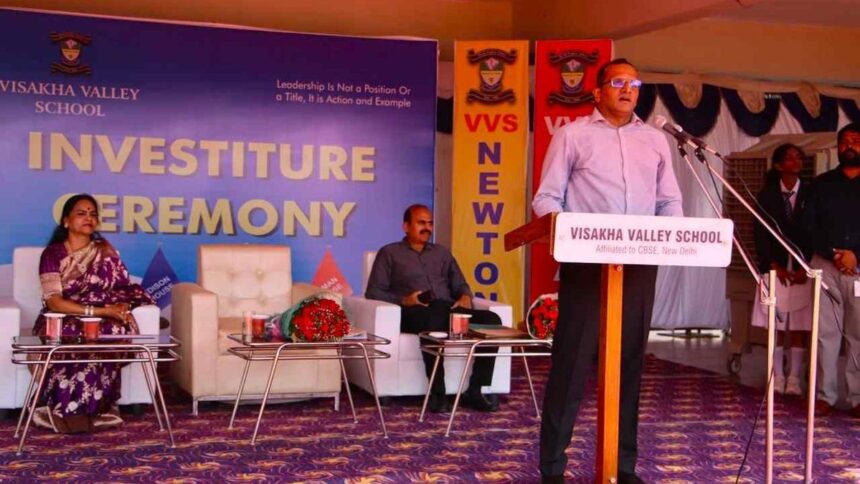The appointment of retired judge V. Parthiban as the one-man commission by the Madras High Court to probe the alleged police excesses while breaking up conservancy workers’ protest in Chennai has spotlighted the persistent challenges in public-private partnership in solid waste management. Among the issues are low wages, inadequate social security, and absence of government jobs for workers’ children on compassionate grounds. Low wages offered by a private company engaged in solid waste management triggered the protest, which morphed into a movement against public-private partnership. The reason: the workers realised that their children would no longer have the opportunity to get government jobs on compassionate grounds.
The quest for permanent government jobs for conservancy workers in Chennai dates back to 1998-1999, when current Chief Minister M.K. Stalin decided to outsource waste management during his tenure as the Mayor. A cleaner ‘Singara Chennai’, successful mechanisation of conservancy, and improved public health were the major priorities of the civic body under his leadership. The downside was that the private sector jobs for cleaning the roads left women workers unmotivated to demand promotion. The wages were inadequate for a family to sustain itself.
Anandhi, 48, holding her four-year-old granddaughter, was one of the 300 workers who had gathered at May Day Park on September 4 to discuss the next course of action against private participation in conservancy work in the Royapuram (V) and Thiru Vi Ka Nagar (VI) zones. She was among the many detained on the night of August 13. “If wages are reduced to ₹16,000 and we are not offered permanent jobs, life will become tougher. I studied only up to Class V, and my four daughters stopped education after Class X. I have married off three of them and taken out loans for their weddings. I need to repay them. My husband has passed away. I do not own any property and need to support my youngest daughter now. The government must at least restore our previous salary of ₹23,000.”
Tapping into life-savings
R. Suja, another worker, said, “Even after the manner in which the police handled us that [August 13] night, we decided to continue the protest. I have loans to repay, and an alcoholic husband who barely contributes anything to the family. Yet, I will not join the private company because it goes against our principles. I am using my life-savings for our daily needs. I hope they last until this issue is resolved.”
Pavai*, a worker from the Thiru Vi Ka Nagar zone, said, “This is the second month without salary. We urge the government to roll back outsourcing and restore our previous salary of ₹23,000 under the National Urban Livelihoods Mission [NULM].”
According to a petition that she handed to an official in the Greater Chennai Corporation, “In August, the Madras High Court ordered ₹761 a day to be paid in wages, along with 16% for ESI and ₹121 for PF; a daily bonus of ₹63; and a festival advance of ₹1,000. Based on this order, I request employment with the Chennai Corporation under the NULM-SHG scheme.”
In the past few years, hundreds of children of permanent conservancy workers have been appointed as permanent employees, on compassionate grounds, after their parents died in harness. However, the children of workers under the PPP model are not eligible for recruitment to government jobs on compassionate grounds. While the city was reported to have turned cleaner under the modern PPP models, conservancy workers, who are mostly of the Scheduled Castes and the Scheduled Tribes and the Other Backward Castes, lost an opportunity to get permanent government jobs.
Crackdown at night
On August 13, more than 300 workers were detained in a late-night police operation after they staged a protest for 13 days outside the Ripon Building. They were demanding that the DMK government roll back its decision to outsource the conservancy work in two zones and restore their wages to ₹23,000. Uzhaippor Urimai Iyakkam and Left Trade Union Centre (LTUC) had spearheaded the protest.
LTUC general secretary V. Hari Prasanth said, “The protest started in 2020 when Urbaser Sumeet launched its operation in seven zones during the AIADMK government. Ramky started its operation in 2020 in zones 1, 2, and 3. Workers under the NULM were getting ₹390 per day until 2020. Now, NULM has been renamed NULM/SHG. Mr. Stalin, when he was the Leader of the Opposition, had sent a letter, dated January 19, 2021, to former Corporation Commissioner G. Prakash, demanding permanent jobs for NULM workers who had served for 10 years. It gave us hope. After the Madras High Court ordered higher wages for NULM workers in September 2023, workers started receiving ₹761 per day. The private company pays around ₹16,000 per month. Permanent government workers get more than ₹50,000 a month. In zones 4, 5, 6, 7, and 8, a total of 5,103 workers under NULM/SHG have been protesting.”
Raja, 50, a protester at May Day Park, said he joined the private firm in the Royapuram zone in August, but quit within a week. Murugan, who joined Chennai Enviro Solutions as a battery-operated vehicle driver about a month ago and works near Parry’s Flower Market, said, “I get ₹16,000-₹17,000. Before this, I was unemployed. Most of the old workers quit.”
Venkat*, a worker of Urbaser Sumeet in the Teynampet zone (IX), gets ₹17,000 a month, apart from the benefits. “We have been promised a hike of ₹4,000 and a festival bonus of ₹4,000-₹5,400. I did not join the protests. The private company had assured us that after eight years of service, we would get a minimum of ₹3.3 lakh in benefits. So, I decided to stay,” he added.
The workers staged demonstrations on July 3, 7, and 11 in 2024, at the Royapuram and Thiru Vi Ka Nagar zonal offices. Major protests were held on September 3 and November 13, 2024, when more than 900 workers staged a sit-in, and later on January 21 and March 26, 2025.
Standing firm: The protesting workers demanded that the DMK government roll back its decision to outsource the conservancy work in two zones and restore their wages to ₹23,000. They stick to their demands even after the government cracked the whip.
| Photo Credit:
Akhila Easwaran
The Corporation passed a resolution to outsource conservancy work on April 30, 2025. While small-scale demonstrations were held across the city against this decision, the major protest began on August 1. Talks failed on August 9. On August 13, the Madras High Court said protests could not be allowed on roads and pathways. That night, the police removed the protesters, detained more than 300 workers, and released them the next day. The government announced six welfare schemes, including insurance cover and housing, on August 14. On August 20, the High Court refused to quash the Corporation’s resolution. At the Corporation Council meeting on August 26, CPI and CPI(M) members staged a walkout against the manner in which the protest was quelled. The same day, the Corporation Council passed resolutions to appoint private parties to monitor solid waste management in the Royapuram and Thiru Vi Ka Nagar zones. On September 1, the Corporation said during a court case that earlier salaries would be maintained for workers until the industrial tribunal delivered its ruling.
CPI(M) plans State-level meeting
CPI(M) Chennai Central district secretary G. Selva, who has been leading the protests, said the party was planning a State-level meeting on September 17 and 18 to discuss the further course of action. He called on the government to guarantee minimum wages, roll back the Government Orders permitting outsourcing of solid waste management, ensure job security, mechanise cleaning of sewers, and establish sanitary engineering departments in colleges.
Arul, 64, a resident of Choolai in the Royapuram zone, said that while cleaning had improved over the years, open dumping persisted.
Manoj Soni, national head, municipal solid waste, RE Sustainability, said Chennai Enviro Solutions had launched India’s most advanced waste collection and transport model in Royapuram and Thiru Vi Ka Nagar. But he avoided answering questions on the protest. “Chennai Enviro Solutions, under the ambitious Package 6 Project, has launched a world-class waste collection and transport operation across the Royapuram and Thiru Vi Ka Nagar zones, setting a benchmark for urban sanitation in India. Designed with cutting-edge technology, AI-driven decision-making, and one of the largest electric waste collection fleets in the country, this initiative is transforming the manner in which Chennai manages its waste from doorsteps to disposal sites while keeping sustainability at its core.”
“At the heart of this project is a state-of-the-art command and control centre, the operational brain linking every vehicle, compactor, sweeper, and beach-cleaning machine through IoT sensors, GPS tracking, and RFID tagging. From here, advanced AI algorithms predict waste generation trends, optimise resource deployment in such high-demand areas as Royapuram, Chennai Port, and commercial market hubs, and track beach cleaning coverage through geo-fenced zones. Daily analytics ensure continuous performance improvement and swift, data-backed decision-making,” he said.
‘Clean city is our aim’
Deputy Mayor Mu. Magesh Kumaar said, “Our aim is not to privatise, but to keep the city clean… The AIADMK government outsourced conservancy work in most of the zones. We have outsourced the work in only two zones. Only the Anna Nagar and Tondiarpet zones are cleaned by permanent workers. After the DMK came to power, we have appointed more than 1,000 children of permanent conservancy workers on compassionate grounds. We are designing welfare schemes to help the children of the conservancy workers under public-private partnership.”
“If the GCC plans to revise the salaries, the adjustment should be made uniform and applied across zones…,” said an official of another private concessionaire.
According to the workers, nothing will stop them in their quest for dignity and a secure government job, until the Centre and the State take suitable policy initiatives to address such issues in local governance in an era of public-private partnership.
(*Names changed)





















